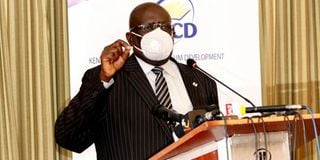Premium
CBC is here to stay, George Magoha insists

Education Cabinet Secretary George Magoha.
The competency-based curriculum (CBC) is a transformative system and will not be scrapped despite widespread outcry over its implementation in schools across the country, Education Cabinet Secretary George Magoha has declared.
Prof Magoha ruled out the possibility of reverting to the 8-4-4 system of education that is being phased out, pouring cold water on raging debate over its extraordinary homework burden on children and parents.
“We know CBC is not perfect but the train left the station in 2018,” Prof Magoha said at a media briefing in Nairobi yesterday, adding that shortcomings in the system will be patched up along the way.
There has been an uproar over the volume and nature of homework teachers have been giving to learners under the CBC, whose implementation is at Grade Five.
The president of the Law Society of Kenya has indicated he intends to seek the intervention of the court to stop the curriculum.
Parents have raised concerns about the cost of the CBC, arguing that it has widened the gap between learners from poor backgrounds and those from wealthy families.
“We have no apologies to make to anybody. CBC is here to stay. It’s the most transformative thing I have seen,” Prof Magoha said.
Teachers have been accused of asking pupils to perform outrageous tasks and carry to school expensive or hard-to-find items for learning purposes, bringing to question national preparedness to implement the curriculum.
Elimu Yetu Coalition National Coordinator, Joseph Wasikhongo, has cautioned the government against turning a deaf ear to challenges that learners, parents and schools are facing.
“The elephant in the room remains awareness. CBC can be as expensive or cheap as you want it to be but teachers and parents don’t know that. We’re in a capitalist society and inequality is inevitable but what are we doing to address it in CBC?” Mr Wasikhongo asked early this month.
The Teachers Service Commission (TSC) has trained 228,000 primary school teachers in both public and private schools on the CBC approach since 2019.
TSC Quality Assurance Director, Reuben Nthamburi, yesterday said the commission would start training secondary school teachers in December and continue up to April next year, with a target of 60,000.
CBC will be rolled out in junior secondary school in January 2023 for pupils currently in Grade Five.
The learners will, at the end of next year, undertake a cumulative assessment that will contribute 40 per cent to their final score, which will determine the secondary schools they will join.
The other 60 per cent will come from formative assessments at Grades Four, Five and Six.
The Kenya National Examinations Council (Knec) will pilot the summative assessment from September 27 to October 1 in 212 schools across the 47 counties. It will involve 18,088 learners.
It is not clear how learners will be placed in secondary school.
There is usually stiff competition for places in national and extra-county schools due to their traditionally good performance.
They also have better learning facilities compared to the county and sub-county schools, which host about 75 per cent of high school learners.
Knec CEO David Njeng’ere said secondary schools would provide two pathways at junior secondary and only those with adequate resources will offer the three.
It is expected that these will most likely be the existing extra-county and national schools.
The pathways under the CBC are Arts and Sports Science, Social Sciences and Science Technology Engineering and Mathematics (Stem).





